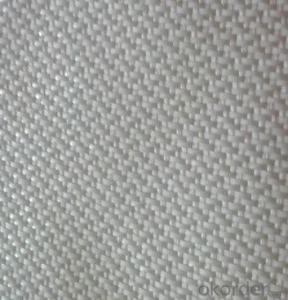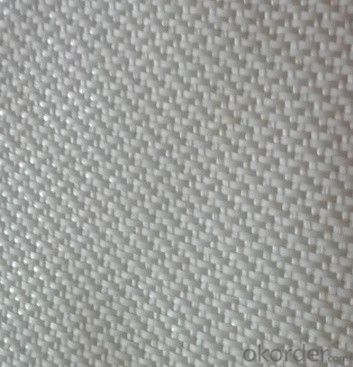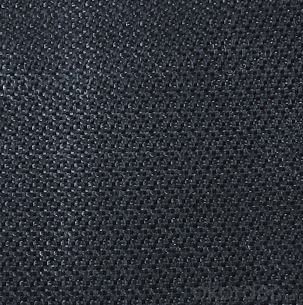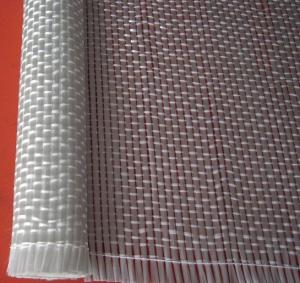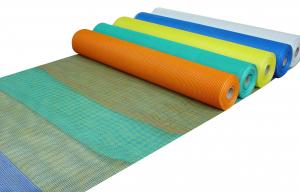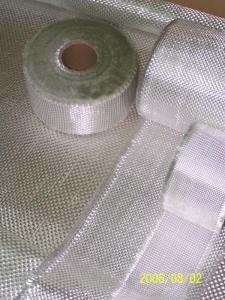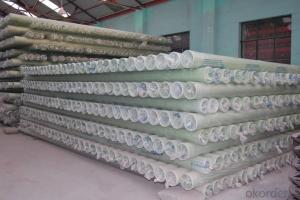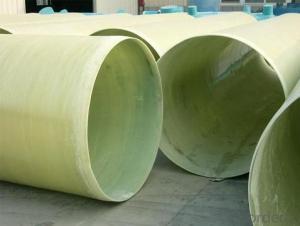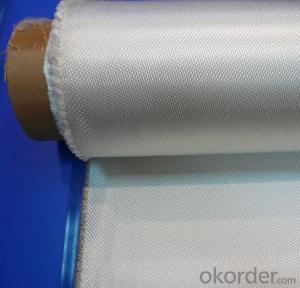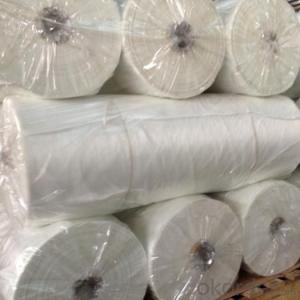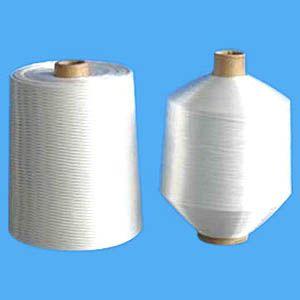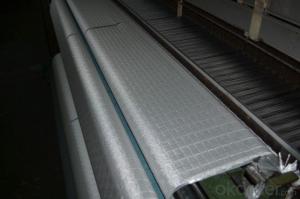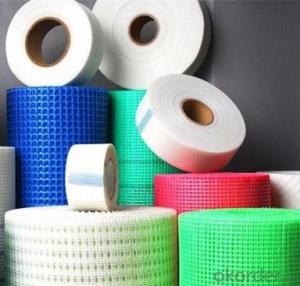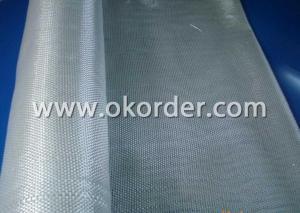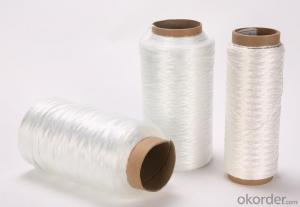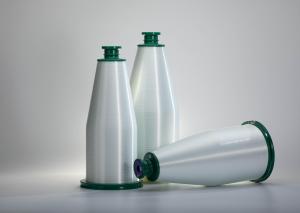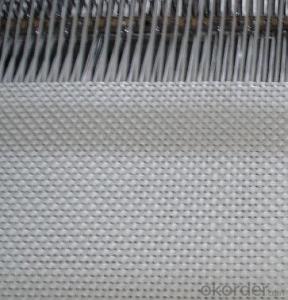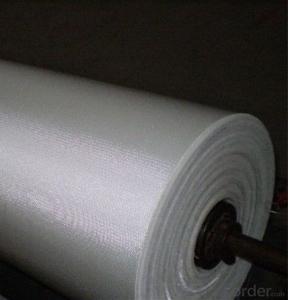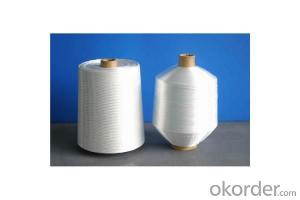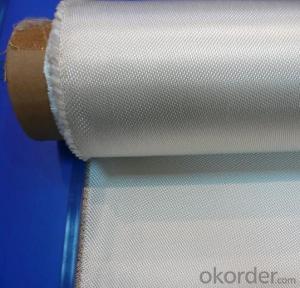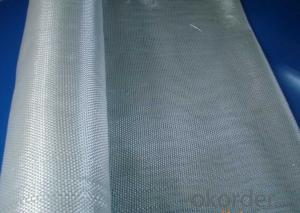High Strength Top Quality Fiberglass Yarn Fabric
- Loading Port:
- Shanghai
- Payment Terms:
- TT OR LC
- Min Order Qty:
- 500 m²
- Supply Capability:
- 50000 m²/month
OKorder Service Pledge
OKorder Financial Service
You Might Also Like
Fiberglass Fabric of High Strength Top Quality
Fiberglass Fabric Introduction:
Fiberglass fabric is weaved by high quality fiberglass,as a kind of engineering material,which is
many excellent characteristics:
flame-resisting,corrosion resistant,high strength,heat resistance.stable structure,good chemical resistance,durability.
Fiberglass Fabric Features:
Warp and weft yarns are parallel arrangement as flat situation, with uniform tension;
Fiber is aligned with large consistency, stable and easy operation;
Good moldability, fast and complete wet out in resins, resulting in high productivity;
Good transparency and high strength of composite products.
Fiberglass Fabric Specification:
mark | Fiber consistency(ends/ cm) |
Area weight (g/ m2) |
Thick-ness (mm) |
Width (cm) |
Length (mm) | Breaking strength(N)≥ |
weave | |||
Warp direction | Weft direction | Warp direction | Weft direction | |||||||
EW200 | 16 | 12 | 200±20 | 0.2 | 90-130 | 300-1200 | 980 | 980 | ||
EW210 | 16 | 12 | 200±20 | 0.21 | 90-130 | 300-1200 | 1080 | 1080 | Twill weave | |
Plain weave | ||||||||||
EWR360 | 3.2 | 1.8 | 354±18 | 0.35 | 50-300 | 100 | 2000 | 2000 | ||
EW280 | 16 | 10 | 280±28 | 0.26 | 90-130 | 300-1200 | 1800 | 1800 | ||
EW300 | 14 | 10 | 320±32 | 0.3 | 90-130 | 300-1200 | 1500 | 1500 | ||
EW430 | 20 | 12 | 420±42 | 0.43 | 90-130 | 300-1200 | 2000 | 2000 | Broken twill | |
EWR136 | 10 | 10 | 136±13 | 0.136 | 100 | 200 | 850 | 850 |
Plain weave | |
EWR200 | 8 | 7 | 200±20 | 0.21 | 100 | 200 | 1200 | 1200 | ||
EWR400 | 3.6 | 3.2 | 400±30 | 0.4 | 100 | 50-100 | 2500 | 2500 | ||
EWR600 | 2.6 | 2.5 | 600±50 | 0.6 | 100 | 40KG | 4000 | 4000 | ||
EWR580 | 2.5 | 2.3 | 576±29 | 0.58 | 100 | 40KG | 3850 | 3850 | ||
EWR800 | 1.8 | 1.8 | 800±60 | 0.8 | 100 | 40KG | 4600 | 4600 | ||
Product Show
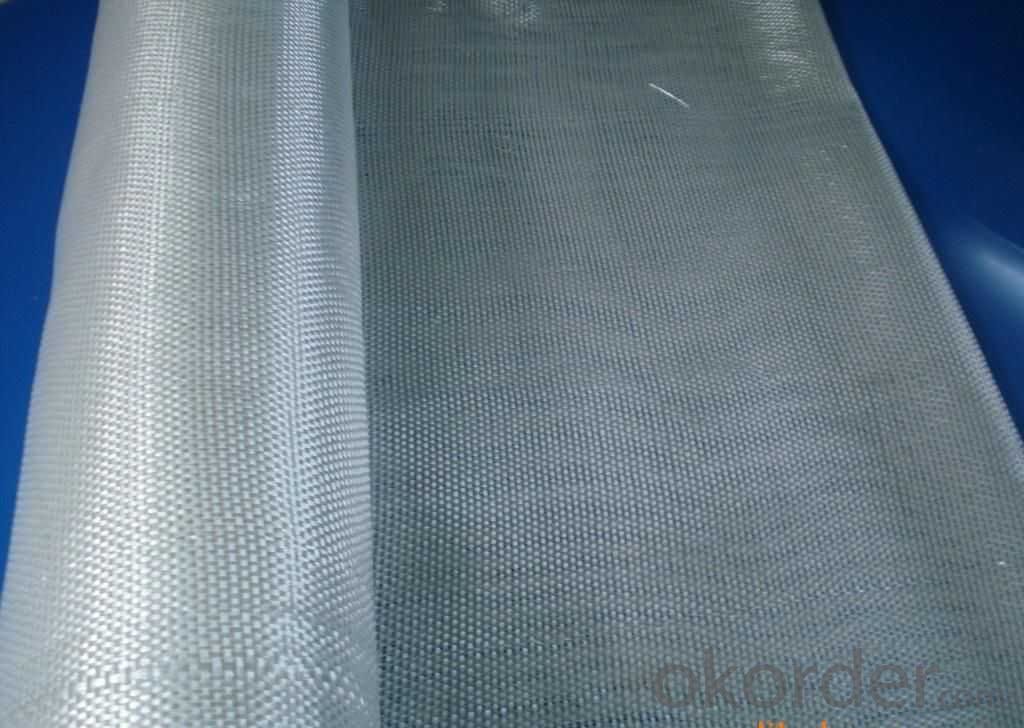
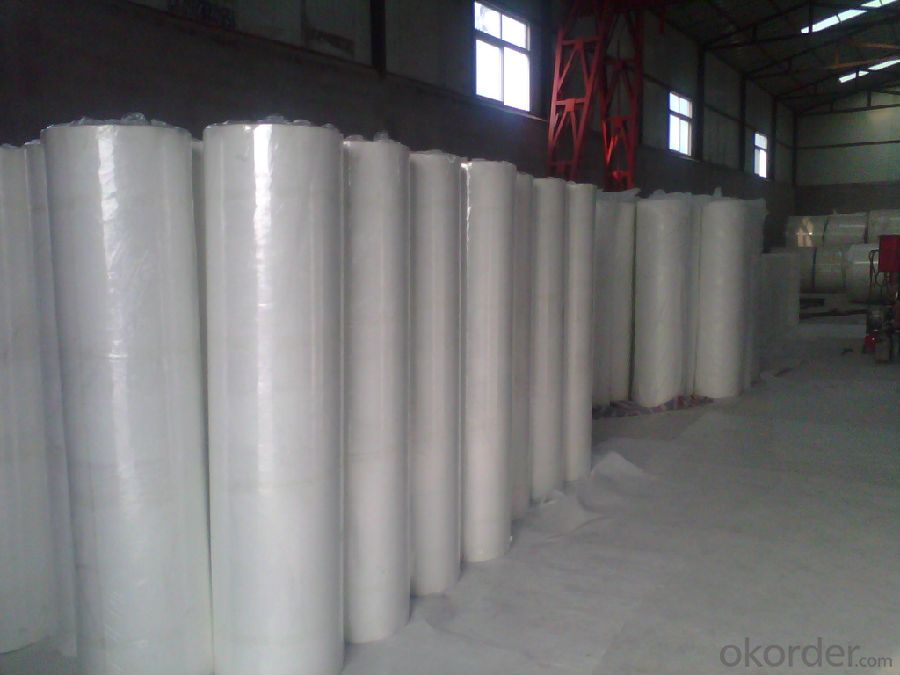
Fiberglass Fabric Usage:
E-glass woven roving is a schistose double faces reinforcement fabric that is weaved into from roving in directly.
E-glass fiber fabric (thin fabrics with thickness from 0.025 to 0.09mm) is suitable for electrical isolation mica product, wax cloth as the reinforcement materials.
E-glass woven roving applys to all kinds of polyester reinforcement system, (such as unsaturated polyester resin, vinylite,epoxy resin and phenolic resin.
E-glass woven roving is a high performance reinforcement material. It is widely used in hand lay-up and machinery processing products, (such as vessel, container, airplane and vehicle component, furniture, athletic facilities and other industry.
FAQ
1.Package of Fiberglass Fabric?
Fiberglass fabric is wound on a paper tube with inner diameters of 50. 8, 76 or 152mm. Each roll is wrapped in a plastic bag, then to be packed in a carton box. The rolls are to be horizontally placed.
Width (cm): 90, 100, 127
Length (m): 100, 200, 300, 400
2.Storage of Fiberglass Fabric?
Store rolls in a cool, dry location
Protect rolls from weather and other damage.
3.If sample available if needed?
We aim to offer our customer best Products&Service,samples are allowed if necessary.
- Q: Is fiberglass yarn resistant to mechanical damage?
- Yes, fiberglass yarn is known for its high resistance to mechanical damage. Fiberglass is a strong and durable material that is commonly used in applications where mechanical strength is crucial. It has excellent resistance to abrasion, impact, and tearing, making it highly resistant to mechanical damage. This makes fiberglass yarn suitable for various industries and applications, such as reinforcements in composites, insulation materials, textiles, and reinforcement in automotive and aerospace industries. Additionally, fiberglass yarn also exhibits good dimensional stability, even under extreme conditions, further enhancing its resistance to mechanical damage.
- Q: Is fiberglass yarn suitable for use in water filtration systems?
- Using fiberglass yarn in water filtration systems is generally not recommended. Despite its advantageous properties like high tensile strength, durability, and resistance to chemicals, it lacks the specific design and optimization required for water filtration purposes. To efficiently eliminate impurities, contaminants, and particles from water, water filtration systems typically demand filter media with distinct characteristics. Fiberglass yarn may not possess the necessary pore size or surface properties to effectively trap and retain particles of various sizes, including fine sediments, bacteria, or other microorganisms. Furthermore, the use of fiberglass yarn in water filtration systems may present potential health risks. Research suggests that fiberglass fibers could be released into the water during filtration, which can be harmful if consumed. These fibers may cause irritation to the skin, eyes, and respiratory system if inhaled or come into direct contact with sensitive areas. Hence, it is advisable to opt for filtration media specifically designed for water filtration systems, such as activated carbon, ceramic, or polypropylene filters. These materials are engineered to efficiently eliminate impurities and contaminants from water while minimizing health hazards.
- Q: Does fiberglass yarn have any special properties?
- Fiberglass yarn indeed possesses unique characteristics. Its high strength-to-weight ratio is particularly remarkable. This implies that it can endure considerable force or tension without breaking, showcasing exceptional tensile strength. Consequently, fiberglass yarn is ideal for applications requiring durability and strength, such as in the manufacturing of composite materials. Furthermore, fiberglass yarn exhibits high resistance to heat, chemicals, and moisture. Even when subjected to extreme temperatures or harsh environments, it maintains its structural integrity and does not easily deform. This versatility renders it suitable for diverse industries, including aerospace, automotive, construction, and marine. Moreover, fiberglass yarn serves as an outstanding electrical insulator. Its inability to conduct electricity makes it valuable for applications necessitating electrical insulation, such as the production of electrical cables and circuit boards. Additionally, fiberglass yarn boasts a low thermal expansion coefficient. Consequently, it remains dimensionally stable despite temperature changes, making it valuable in applications where stability is crucial. Furthermore, fiberglass yarn is fire-resistant. It does not readily burn and can endure high temperatures without emitting toxic fumes or smoke. This characteristic positions it as a preferred material for fireproofing applications. In summary, fiberglass yarn possesses numerous exceptional properties, including high strength-to-weight ratio, resistance to heat, chemicals, and moisture, excellent electrical insulation, low thermal expansion coefficient, and fire resistance. These properties establish it as a versatile material with countless applications in various industries.
- Q: How does fiberglass yarn perform in sound insulation?
- Fiberglass yarn performs exceptionally well in sound insulation due to its high density and excellent sound absorption properties. It effectively traps and absorbs sound waves, reducing noise transmission and improving overall acoustics in various applications such as walls, ceilings, and panels.
- Q: Is fiberglass yarn resistant to pests or insects?
- Yes, fiberglass yarn is resistant to pests and insects.
- Q: Can fiberglass yarn be used in the production of curtains and blinds?
- Curtains and blinds can indeed be produced using fiberglass yarn. This versatile material possesses numerous advantages for curtains and blinds. Notably, it is lightweight, durable, and resistant to heat, fire, and chemicals. Moreover, fiberglass yarn is renowned for its exceptional insulation properties, which aid in maintaining desired room temperatures. Additionally, it boasts high tensile strength, making it ideal for crafting robust and long-lasting curtains and blinds. The inclusion of fiberglass yarn in curtains and blinds offers improved privacy, light control, and defense against harmful UV rays. All in all, fiberglass yarn represents a dependable and pragmatic choice for the production of curtains and blinds, delivering both aesthetic appeal and functional benefits.
- Q: Can fiberglass yarn be used in composites?
- Yes, fiberglass yarn can be used in composites. Fiberglass yarn is a type of textile material made from fine fibers of glass. It is commonly used as a reinforcing material in composite materials, which are made by combining two or more different materials to create a new material with improved properties. In composites, fiberglass yarn is typically used as a reinforcement material in combination with a matrix material, such as a resin or polymer. The fiberglass yarn provides strength and stiffness to the composite, while the matrix material holds the fibers together and transfers load between them. The use of fiberglass yarn in composites offers several advantages. First, fiberglass yarn has high tensile strength, which makes it an effective reinforcement material. It also has good resistance to chemicals, moisture, and high temperatures, making it suitable for a wide range of applications. Additionally, fiberglass yarn can be easily woven or knitted into various fabric forms, such as plain weave, twill weave, or satin weave, allowing for the creation of different composite structures. It can also be used in combination with other reinforcement materials, such as carbon fiber or aramid fiber, to create hybrid composites with tailored properties. Overall, fiberglass yarn is a versatile and widely used reinforcement material in composites, offering excellent strength, durability, and resistance to various environmental conditions.
- Q: Can fiberglass yarn be used for making swimwear?
- Yes, fiberglass yarn can be used for making swimwear. Fiberglass is a strong and durable material that is resistant to water and chemicals. It can provide excellent support and shape retention, making it ideal for swimwear. Additionally, fiberglass yarn is lightweight and has a smooth surface, providing a comfortable and sleek fit. However, it is important to note that fiberglass can be irritating to the skin, so proper lining or coating may be necessary to ensure comfort and safety.
- Q: How does fiberglass yarn perform in low-temperature environments?
- Fiberglass yarn has gained recognition for its exceptional performance in low-temperature settings. Its inherent qualities, such as its impressive tensile strength, low thermal conductivity, and resistance to moisture, enable fiberglass yarn to remain stable and durable in even the harshest cold conditions. Maintaining its structural integrity is one of the primary benefits of using fiberglass yarn in low-temperature environments. Unlike other materials that may become brittle or weaken when exposed to low temperatures, fiberglass yarn retains its flexibility and strength, making it suitable for a wide range of applications in cold climates. The low thermal conductivity of fiberglass yarn also plays a significant role in its performance in low temperatures. This attribute provides excellent insulation properties, effectively preventing heat loss and maintaining a consistent temperature. Consequently, fiberglass yarn is an ideal choice for applications that require thermal insulation, such as cold storage facilities or refrigerated transportation. Furthermore, fiberglass yarn demonstrates remarkable resistance to moisture, which is often a concern in low-temperature environments. Moisture can lead to the formation of ice, which can adversely affect the performance of materials. However, fiberglass yarn's resistance to moisture ensures that it remains unaffected by freezing or thawing cycles, allowing it to retain its properties and performance over time. To summarize, fiberglass yarn excels in low-temperature environments due to its exceptional tensile strength, low thermal conductivity, and resistance to moisture. These qualities make it a reliable option for a variety of applications in cold climates, offering durability, insulation, and stability even in extreme cold conditions.
- Q: What are the advantages of using fiberglass yarn in reinforced plastics?
- There are several advantages of using fiberglass yarn in reinforced plastics. Firstly, fiberglass yarn is known for its high strength-to-weight ratio. This means that even a small amount of fiberglass yarn can significantly enhance the strength and durability of the reinforced plastics. This is especially beneficial in industries where lightweight materials are required, such as aerospace and automotive industries. Secondly, fiberglass yarn has excellent resistance to corrosion, chemicals, and moisture. This makes it an ideal choice for applications that are exposed to harsh environments or corrosive substances. The resistance to moisture also ensures that the reinforced plastics retain their strength and integrity over time, even in humid or wet conditions. Another advantage of using fiberglass yarn is its dimensional stability. Fiberglass has low thermal expansion, meaning it will not expand or contract significantly with changes in temperature. This is crucial for applications where precise dimensions need to be maintained, as it ensures that the reinforced plastics will not warp or deform over time. Furthermore, fiberglass yarn is highly versatile and can be easily customized to meet specific design requirements. It can be woven or knitted into various patterns, allowing for different levels of strength and flexibility. Additionally, its compatibility with different resin systems makes it suitable for a wide range of manufacturing processes, including pultrusion, filament winding, and hand lay-up. Lastly, fiberglass yarn is relatively cost-effective compared to other reinforcing materials, such as carbon fiber. It offers a good balance of performance and affordability, making it a preferred choice for many industries. The lower cost of fiberglass yarn allows for more widespread use in various applications, contributing to its popularity in the reinforced plastics industry. In conclusion, the advantages of using fiberglass yarn in reinforced plastics include its high strength-to-weight ratio, resistance to corrosion and moisture, dimensional stability, versatility in design, and cost-effectiveness. These benefits make fiberglass yarn an excellent choice for enhancing the performance and durability of plastics in various industries.
Send your message to us
High Strength Top Quality Fiberglass Yarn Fabric
- Loading Port:
- Shanghai
- Payment Terms:
- TT OR LC
- Min Order Qty:
- 500 m²
- Supply Capability:
- 50000 m²/month
OKorder Service Pledge
OKorder Financial Service
Similar products
Hot products
Hot Searches
